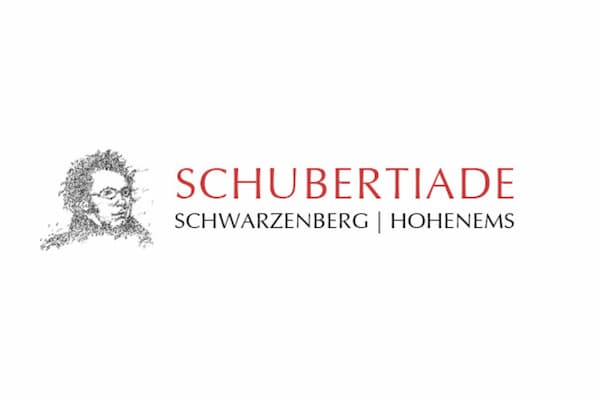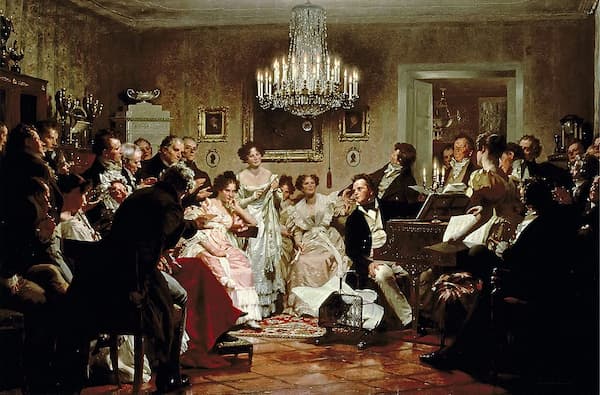In 2025, the Schubertiade festival celebrates its 50th anniversary, marking half a century of devotion to the music of Franz Schubert and the rich tradition of chamber music and lieder. What began as a modest series of concerts in the quaint Austrian town of Hohenems has blossomed into one of the world’s most prestigious and beloved musical events.
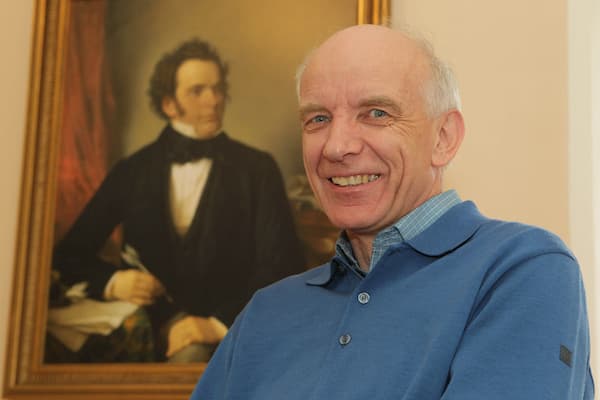
Gerd Nachbauer © Bernd Hofmeister
To be sure, the festival has grown from intimate gatherings into a global phenomenon, drawing tens of thousands of music lovers annually to experience its unique blend of exceptional performances and idyllic Alpine settings.
To celebrate this golden jubilee of enduring appeal and unwavering commitment to artistic excellence, Interlude spoke to Gerd Nachbauer, who founded the Schubertiade Hohenems alongside Hermann Prey in 1976.
Prégardien/ Drake: “Schubertiade Hohenems 2022”
Origins
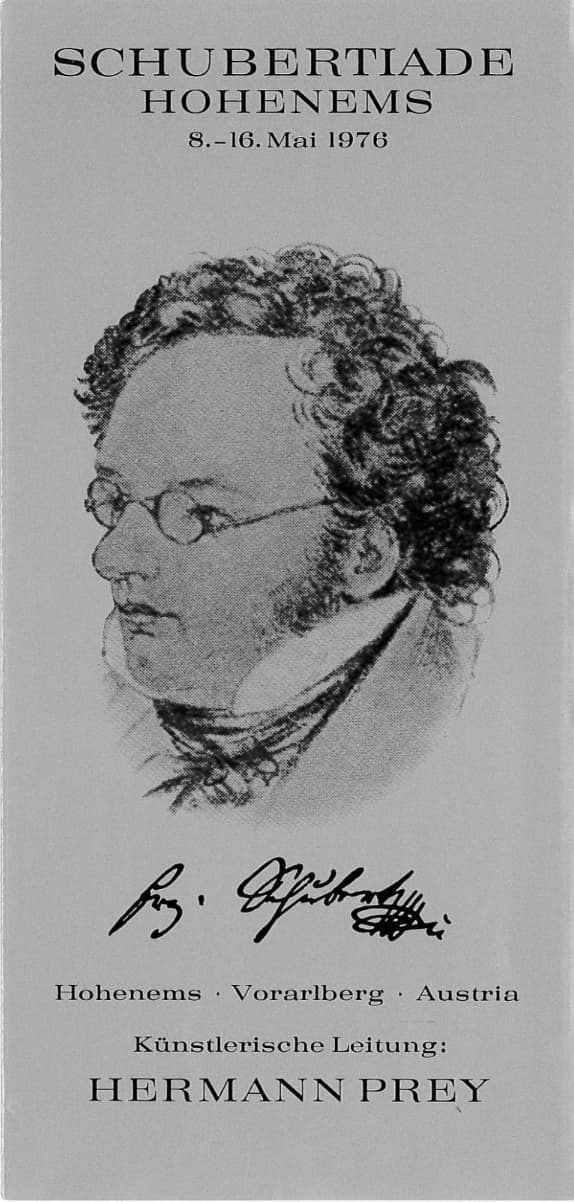
The first Schubertiade Hohenems, 1976
It all started with Gerd Nachbauer inviting Hermann Prey to participate in a small yearly festival situated in the town of Hohenems. As Nachbauer explained, “during the planning phase of a song recital scheduled for June 1975, Hermann Prey’s secretary Christian Lange suggested that this concert could serve as a test for a larger project associated with the names Prey and Schubert.”
This initial proposal for a concert linking Prey with Schubert’s music planted the seed that eventually blossomed into the renowned Schubertiade. The principle aim was to present Schubert’s complete oeuvre over a period of 12 years. After 2 years of planning, the first Schubertiade began on 8 May 1976 with a song recital by Hermann Prey accompanied by Leonard Hokanson.
Rennert/Johnson: “Schubertiade Schwarzenerg 2022”
Vision
The original vision foresaw the performances of the complete Schubert oeuvre in chronological order. For obvious reasons, this idea was not entirely practical nor feasible, and the primary emphasis remained on solo performances. In essence, the early years of the Schubertiade focused on simplicity and on communicating the intimacy of Schubert’s solo vocal compositions.
Nevertheless, the idea of bringing Schubert’s unknown or then-inaccessible compositions to the general public persisted. As Gerd Nachbauer noted, “a significant portion of Schubert’s compositions had remained under the radar,” and the Schubertiade now offered a vital channel to share these works with a wider audience. One aspect of that vision was to showcase Schubert’s music in larger concert halls, expanding beyond the traditional limits of smaller venues.
Youn/Karg/Bedenko: “Schubertiade Hohenems 2018”
Venue Choices
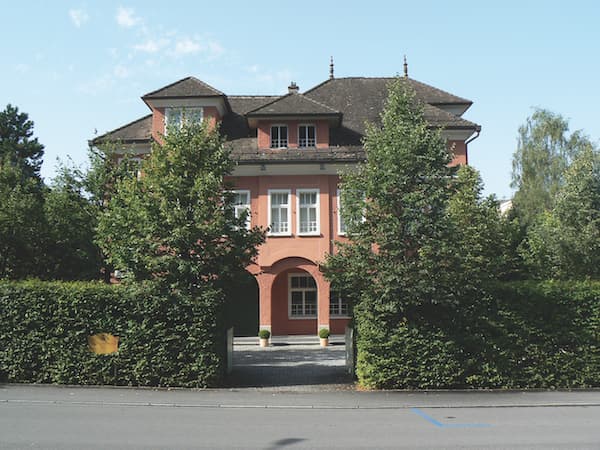
Markus Sittikus Hall in Hohenems, Austria
Currently, the Schubertiade is held in two unique locations, in Hohenems and Schwarzenberg. Establishing these venues, however, was no small task. The Markus Sittikus Hall, named after the Salzburg prince-archbishop Markus Sittikus von Hohenems, is housed in a building dating from 1913. It was completely renovated by the Schubertiade, and as Gerd Nachbauer explained, “on account of its acoustical qualities, it is now one of the world’s best halls for the performance of chamber music and Lieder.”
The idyllic village of Schwarzenberg has been an important venue for the Schubertiade since 1994. The “Angelika Kauffmann Hall” is named after the exceptional Neoclassical painter whose father brought her to their ancestral home in Schwarzenberg following her mother’s death. Kauffmann is one of only two female painters among the founding members of the Royal Academy in London, and the hall in her honour is built in a simple timber construction and also offers perfect acoustic conditions. In fact, its fantastic sound properties have been compared to London’s Wigmore Hall.
Arcayürek & Bushakevitz: “Schubertiade Schwarzenberg 2024”
Cultural Frame
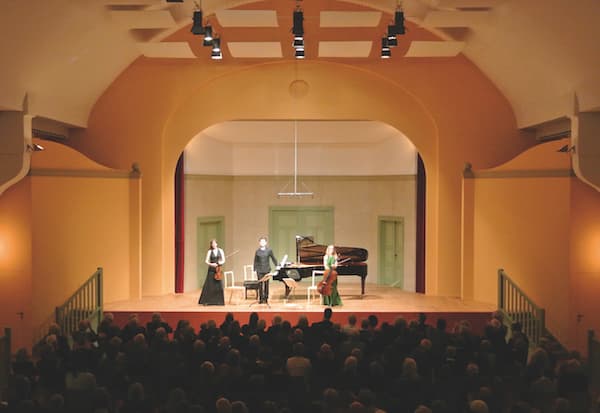
A chamber music concert in Markus Sittikus Hall
Over the last 5 decades, the Schubertiade has grown from an intimate celebration of Franz Schubert’s music into a renowned international event, drawing musicians, scholars, and enthusiasts to its locations in Hohenems and Schwarzenberg. It has evolved into an organic event of creativity fuelled by the dedication of Gerd Nachbauer, artists, and the community.
This organic development extends beyond the festival proper to a collection of museums that naturally complement the musical focus. Established by Gerd Nachbauer, the Schubert Museum offer immersive explorations of Schubert’s life, works, and reception, while the Elisabeth Schwarzkopf, Walter Legge, Stefan Zweig and Nibelungen Museums enrich the cultural tapestry with festival-related and local heritage.
Schubertiade 2025
Franz Schubert’s music, for Gerd Nachbauer, “goes straight to the heart, and conveys something deeply moving and emotionally resonant.” The 2025 Schubertiade is set to celebrate Nachbauer’s founding dream and Schubert’s enduring legacy.
Interlude will be on site for the Schubertiade Hohenems from 10-14 July 2025; please check back soon and often for updates, interviews, concert reviews, and festival-related activities.
For more of the best in classical music, sign up for our E-Newsletter

